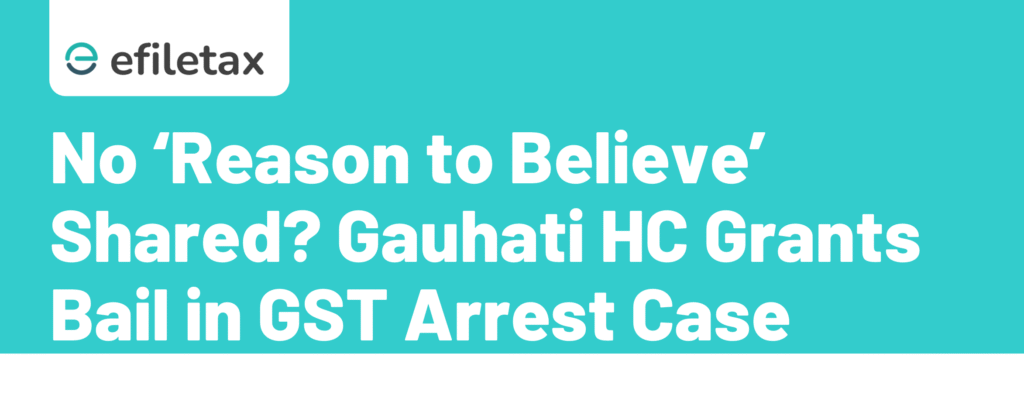
Gauhati HC Grants Bail in GST Fraud Case Why ‘Reason to Believe’ Matters
Focus Keyphrase: GST fraud arrest
In a recent GST fraud arrest, the Gauhati High Court highlighted a critical safeguard under tax law — the right of the accused to be informed of the “reason to believe” before being arrested. The case reveals key procedural gaps and reinforces taxpayer rights under the GST framework.
Let’s break it down.
Case Summary: What Triggered the Conditional Bail?
- Authority Involved: Directorate General of GST Intelligence (DGGI)
- Issue: Alleged GST fraud involving input tax credit
- Accused’s Argument: Was not informed about the specific “reason to believe” behind the arrest
- Court’s View: Non-communication violates procedural rights under Section 69 of CGST Act
- Outcome: Bail granted with conditions
Legal Basis: What Does Section 69 of CGST Act Say?
Under Section 69(1) of the Central Goods and Services Tax Act, 2017:
The Commissioner can authorize arrest if he has reason to believe that a person committed an offence listed in clauses (a) to (d) of Section 132.
But here’s the key:
Arrest without communicating the “reason to believe” is procedurally flawed, and violates Articles 21 and 22 of the Constitution.
Why This GST Fraud Arrest Became a Landmark Reminder
The Gauhati HC reiterated that procedural fairness cannot be bypassed:
- Merely recording internal satisfaction is not enough.
- The accused must be clearly told why they’re being arrested.
- Failure to do so weakens the legitimacy of the arrest.
Expert View:
“Section 69 empowers arrest, but not at the cost of natural justice. Arrest must be justified and explained.” — A senior GST counsel from Guwahati.
Conditions of Bail Granted
The Court imposed certain conditions for bail:
- Accused must cooperate with the investigation
- Cannot leave the jurisdiction without prior permission
- Must not tamper with evidence or approach co-accused
Similar High Court Rulings Reinforce the Stand
| Case | Court | Key Takeaway |
|---|---|---|
| P.V. Ramana Reddy | Telangana HC | ‘Reason to believe’ must exist before arrest |
| Ashok Kumar Sureka | Calcutta HC | Commissioner must form opinion, not just officers |
| Deep Soni v. UoI | Rajasthan HC | Communication of reason is mandatory |
Know Your Rights Before a GST Arrest
If you’re facing scrutiny from GST authorities:
✅ Ask for written communication of “reason to believe”
✅ Insist on arrest memo under DK Basu guidelines
✅ Seek legal representation immediately
✅ Remember — non-bailable offences still require procedural compliance
Why This Matters for Indian Taxpayers
This GST fraud arrest case highlights how procedural safeguards under the Constitution and GST law must be followed, even during anti-evasion actions. It empowers taxpayers to defend against arbitrary actions and builds confidence in due process.
Summary
Gauhati HC granted conditional bail in a GST fraud arrest case as DGGI failed to inform the accused of the “reason to believe.” The Court held this violated Section 69 of CGST Act and constitutional safeguards.
FAQs
Q1. Can GST officers arrest without prior notice?
Yes, but only after forming and communicating a “reason to believe” under Section 69.
Q2. Is bail possible in GST fraud cases?
Yes, especially when procedural lapses like failure to inform are proven.
Q3. What is a non-bailable GST offence?
Offences involving ITC frauds above ₹5 crore under Section 132(1)(c) are non-bailable.
Final Word
Facing a GST fraud arrest? Know your rights, demand transparency, and consult experts. At Efiletax, we help you navigate legal risks and protect your compliance record.